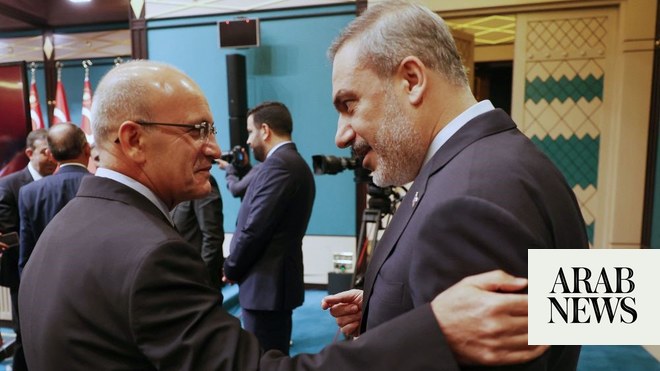
Turkey has stationed troops in several countries in the Middle East and the Horn of Africa in recent years, and has been carrying out cross-border operations for decades.
Turkish troops are usually stationed in foreign countries after agreements have been reached with host governments. With a parliamentary motion requesting a one-year mandate to deploy troops in Libya newly approved, it is important to remember that other mandates have been passed by the Turkish Parliament in previous years that allowed Ankara to deploy forces and carry operations beyond its borders.
The Turkish Parliament recently ratified a motion to extend a military mandate for operations in Syria and Iraq until Oct. 30 this year. It also approved an extension to the deployment of Turkish troops in Lebanon until Oct. 31, which marks the twelfth time it has been extended since it was first approved in September 2006. The Turkish forces are part of the UN Interim Force in Lebanon, also known as UNIFIL, which includes 10,600 troops from 40 countries. It was established in 1978, when Israel withdrew from Lebanon, to provide security and help the Lebanese government reestablish its authority.
In Syria and Iraq, the presence of Turkish troops is directly related to the threat in both countries from the separatist PKK to Turkey’s national interests. Although the Turkish military presence in Syria is staunchly opposed by the embattled Syrian regime, Turkey has carried out three major military operations in northern Syria since 2016: Euphrates Shield, Olive Branch and Peace Spring.
In Iraq, the Turkish army regularly conducts cross-border counterterrorism operations in the north, where PKK terrorists have hideouts and bases from which they carry out attacks on Turkey. These anti-terror efforts intensified after July 2018 and have become routine in an attempt to eliminate the terrorist threat in the area. However, the presence since March 2015 of about 500 Turkish troops in Bashiqa, near Mosul, to help train local forces to fight Daesh began to cause friction between Ankara and Baghdad in January 2017, sparking a serious political crisis and even talk of war between the two neighbors.
The extension of the authorization for cross-border army operations in Syria was backed by all parties in Turkey, except for the pro-Kurdish HDP. Libya is a different matter, however. Kemal Kilicdaroglu, the leader of the main opposition Republican People’s Party, has strongly criticized the government’s willingness to send Turkish soldiers there. The justification given for deployment is that developments in the North African country pose threats to Turkish business interests and vessels in the Mediterranean.
Details such as the timing of a Libyan deployment, the range of the mission and number of the troops will be decided by the president, according to the parliamentary motion. It is obvious from the wording of the motion that the deployment has both long-term and short-term objectives. Time will tell how Turkey’s campaign evolves in Libya, how long it lasts and whether it will achieve the desired outcome. What is important at this stage is how Ankara will garner support for a potential Libya campaign.
Defense Minister Hulusi Akar has expressed hopes of resolving the ongoing disagreement with Russia over the issue through discussions and negotiation. Noting the close relationship between Turkish President Recep Tayyip Erdogan and his Russian counterpart Vladimir Putin, Akar said: “We also have military-to-military dialogue. Our wish and expectation is to resolve the (Libya) problem through dialogue.” He also underlined the fact that it is impossible for the two countries to remain indifferent to Libya.
The strategic dialogue about Syria between Russia and Turkey, with Iran, through the Astana process is significant but is a different situation that cannot be compared with Libya; the stakes, actors, processes and context reveal the differences. The meeting on Jan. 8 between Erdogan and Putin will give us a better idea about any possible Turkish-Russian deal or, most likely, whether they will “agree to disagree” about Libya.
The EU is the party most concerned about the possibility of a Turkish-Russian deal on Libya. “Any deal between Turkey and Russia would push the EU out,” Italian Prime Minister Giuseppe Conte said on Dec. 12. “We must be united; we cannot allow actors much more distant from Libya to position themselves, settle their role in the Libyan scenario and claim the primacy for any solutions.” Unity within the EU will be difficult to achieve, however, as the members are divided over which side to support in Libya.
Turkey began the new year by approving the parliamentary motion to deploy troops in Libya. Recent history reveals that hard power is replacing soft power in Ankara’s dealings with some countries in the Middle East. This is a result of increasing conflicts in the region, the perceived threats to Turkish national interests, and regional rivalries.
Sinem Cengiz is a Turkish political analyst who specializes in Turkey’s relations with the Middle East. Twitter: @SinemCngz
Disclaimer: Views expressed by writers in this section are their own and do not necessarily reflect Arab News" point-of-view












